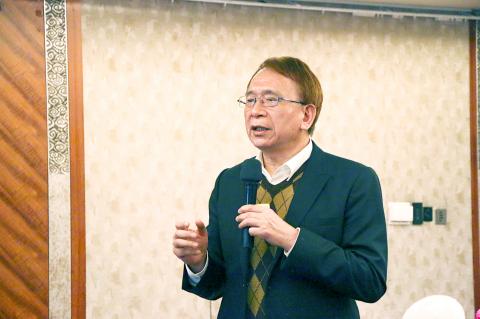Former TTY Biopharm Co (台灣東洋藥品) chairman Lin Rong-jin (林榮錦) yesterday was sentenced to 10 years in prison on charges of embezzlement — a verdict that he said he would appeal.
A year after Lin’s departure in 2014, TTY Biopharm chairman Clark Hsiao (蕭英鈞) launched a lawsuit against his predecessor alleging that he had caused the company NT$3 billion (US$99.48 million at the current exchange rate) in losses.
The Taipei District Court yesterday found Lin guilty on four counts of violations of the Securities and Exchange Act (證交法), including breach of trust and conducting abnormal transactions.

Photo: Chen Yung-chi, Taipei Times
He also has to turn in 22.89 million euros (US$27.39 million) in unlawful gains, the verdict read.
Lin was accused of in 2013 transferring a number of patents held by TTY Biopharm to Switzerland-based Inopha AG — a company that Lin controls through Center Laboratories Inc (晟德大藥廠), of which he is the chairman — along with all the rights to further develop the intellectual property.
The patents include treatments for breast and ovarian cancers, as well as fungal infections and schizophrenia, which were transferred for Lin’s personal gain at the expense of TTY BioPharm, the ruling said.
Lin said the investigation does not reflect the entirety of the case and that the accusations originated from a personal row with Hsiao, his longtime business partner.
He said that his reputation and track record in Taiwan’s biotechnology sector speaks for itself and that he trusts that the court would uncover the truth.
Lin, a notable figure in the industry who has had a hand in the founding of several Taiwanese biotechnology firms, was enlisted to restructure then-ailing TTY Biopharm in 1994.
Lin helped bring the company back into the black.
He is credited with transitioning a company focused on manufacturing and selling generic drugs to developing and marketing branded and more advanced generic drugs.

CHIP WAR: Tariffs on Taiwanese chips would prompt companies to move their factories, but not necessarily to the US, unleashing a ‘global cross-sector tariff war’ US President Donald Trump would “shoot himself in the foot” if he follows through on his recent pledge to impose higher tariffs on Taiwanese and other foreign semiconductors entering the US, analysts said. Trump’s plans to raise tariffs on chips manufactured in Taiwan to as high as 100 percent would backfire, macroeconomist Henry Wu (吳嘉隆) said. He would “shoot himself in the foot,” Wu said on Saturday, as such economic measures would lead Taiwanese chip suppliers to pass on additional costs to their US clients and consumers, and ultimately cause another wave of inflation. Trump has claimed that Taiwan took up to

A start-up in Mexico is trying to help get a handle on one coastal city’s plastic waste problem by converting it into gasoline, diesel and other fuels. With less than 10 percent of the world’s plastics being recycled, Petgas’ idea is that rather than letting discarded plastic become waste, it can become productive again as fuel. Petgas developed a machine in the port city of Boca del Rio that uses pyrolysis, a thermodynamic process that heats plastics in the absence of oxygen, breaking it down to produce gasoline, diesel, kerosene, paraffin and coke. Petgas chief technology officer Carlos Parraguirre Diaz said that in

Japan intends to closely monitor the impact on its currency of US President Donald Trump’s new tariffs and is worried about the international fallout from the trade imposts, Japanese Minister of Finance Katsunobu Kato said. “We need to carefully see how the exchange rate and other factors will be affected and what form US monetary policy will take in the future,” Kato said yesterday in an interview with Fuji Television. Japan is very concerned about how the tariffs might impact the global economy, he added. Kato spoke as nations and firms brace for potential repercussions after Trump unleashed the first salvo of

SUPPORT: The government said it would help firms deal with supply disruptions, after Trump signed orders imposing tariffs of 25 percent on imports from Canada and Mexico The government pledged to help companies with operations in Mexico, such as iPhone assembler Hon Hai Precision Industry Co (鴻海精密), also known as Foxconn Technology Group (富士康科技集團), shift production lines and investment if needed to deal with higher US tariffs. The Ministry of Economic Affairs yesterday announced measures to help local firms cope with the US tariff increases on Canada, Mexico, China and other potential areas. The ministry said that it would establish an investment and trade service center in the US to help Taiwanese firms assess the investment environment in different US states, plan supply chain relocation strategies and